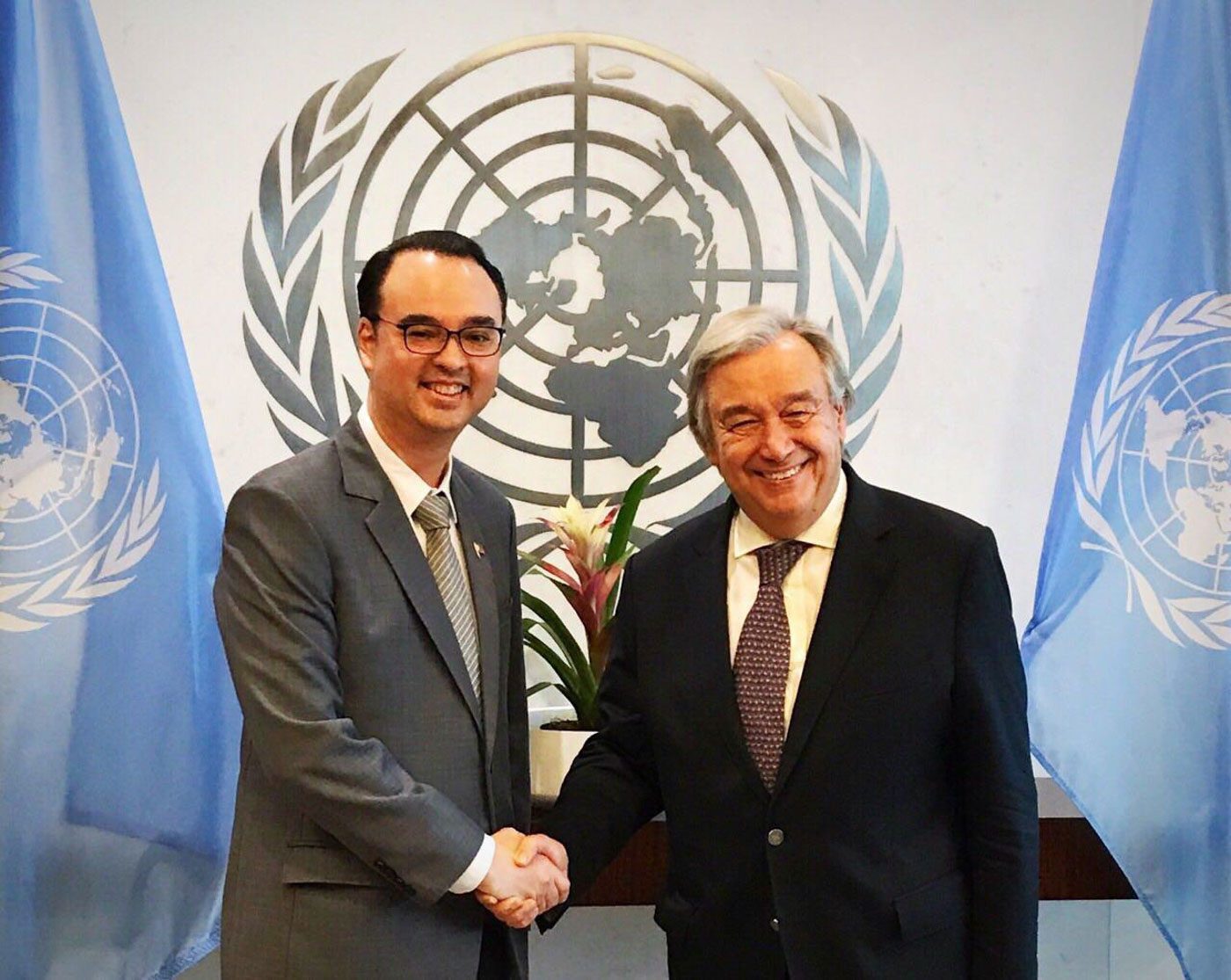SUMMARY
This is AI generated summarization, which may have errors. For context, always refer to the full article.

MANILA, Philippines – The Philippines is willing to receive experts to assess the state of human rights in the country – as long as they have “no bias against the Philippines,” Philippine Foreign Secretary Alan Peter Cayetano said.
Cayetano relayed this message in a meeting with United Nations Secretary General António Guterres on Friday, September 29, according to a statement from the Philippine Department of Foreign Affairs (DFA).
“All we want is an impartial assessment and not outright condemnation to help us understand the extent of the problems that we are confronted with,” Cayetano told Guterres, according to the DFA statement released on Saturday, September 30.
On UN rapporteur Agnes Callamard, the DFA said she “had already prejudged the human rights situation in the country and even referred to President Duterte as a murderer.”
Callamard is the special rapporteur on extrajudicial, summary, or arbitrary executions at the Office of the UN High Commissioner for Human Rights.
According to the DFA, Cayetano showed Guterres “published statements and social media postings of Special Rapporteur Callamard that were critical of the Duterte administration.”
“How can someone who is in league with our political opposition conduct a fair and objective assessment of our human rights situation?” Cayetano told the UN secretary general. (READ: UN expert in PH: Punitive measures worsen drug problem)
Callamard has already visited the Philippines, albeit on an “academic visit,” in May 2017. That means Callamard did not investigate the human rights situation in the country during her visit. She was here to attend a conference on drug policies.
DFA spokesperson Robespierre Bolivar said that no specific special rapporteurs were discussed during the meeting. He said, however, that those willing to pay a visit would be welcome “as long as the experts demonstrate that they do not have biases against the Philippines and are willing to conduct a fair and objective assessment of the human rights situation in the country.”
Bolivar, expounding on the DFA statement, told reporters: “The most important issue is the objectivity and impartiality of the UN experts. [Callamard] is seemingly lacking in these criteria. A special rapporteur should not be making conclusions or passing judgments on a country or government prior to actually having a constructive dialogue with that government. Otherwise, her impartiality and objectivity to conduct the inquiry is severely compromised.”
Callamard has been critical of President Rodrigo Duterte’s administration, most recently when the House of Representatives, which is dominated by a “supermajority” allied with Duterte, slashed the Commission on Human Rights budget to a mere P1,000 ($20).
The budget was eventually restored – albeit cut by over P100 million ($1.96 million).
Working with the UN
The DFA noted that the meeting with Guterres “came a day after the Philippines responded strongly against criticisms of its human rights record by Iceland and several other mostly European countries before the UN Human Rights Commission in Geneva.”
Since Duterte took office, law enforcers – mostly the police – have implemented a relentless war on drugs in the Philippines. While it is still supported by many Filipinos, it has also been criticized by individuals and groups here and abroad for its supposed disregard for human rights.
At least 6,225 deaths have been linked to the drug war – alleged drug personalities killed during police operations, homicides with links to illegal drugs, and law enforcers killed in action. Tens of thousands have been arrested in police operations while more than a million drug personalities have “surrendered” through a door-to-door campaign by police.
And while support is there, Filipinos are beginning to feel afraid, according to surveys.
More than half don’t believe the police’s claim that those who died “fought back,” or “nanlaban” in Filipino. More than three-fourths of Filipinos, in a March 2017 survey, said they were worried that they or someone they knew would be a victim of extrajudicial killings.
But Cayetano argued that while the drug war is not perfect “perceptions have overtaken us in Western media that make it appear the situation is worse than it actually is.”
“Our campaign against crime and illegal drugs is not intended to violate human rights; it is intended protect the human rights of our people,” he said.
Cayetano invited the UN to “help Manila draw up the mechanisms for this collaboration.”
“We will fully cooperate and work with you on a rationale, open, fair dialogue on our campaign against crime and illegal drugs,” said Cayetano, who ran – but lost – in 2016 as Duterte’s vice presidential candidate. – Rappler.com
*$1 = P50.94
Add a comment
How does this make you feel?
There are no comments yet. Add your comment to start the conversation.